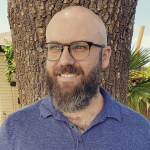For now we see in a mirror dimly, but then face to face. Now I know in part; then I shall know fully, even as I have been fully known.
1 Corinthians 13:12, ESV
Uncertainty is a fact of life for as long as you have this life. This is not true for the next one, but it is true for this one. We can see only pieces, and, as Paul says, we can know only in part.
When we think about what our day will look like tomorrow, more often then not, we've got a pretty good idea. This idea, for however good it is, is still, in reality, an educated guess. We're pretty close most of the time, but regardless of how close we are we cannot escape the fact that it is still a guess. One day our guess will be wrong. Our tire will go flat, a job will be lost, or someone will require a visit to the emergency room.
We know how life goes, until we don't.
The Greek word translated as "mirror dimly" in the verse above is where we get the English word 'enigma' from. An enigma is a mystery tucked inside a black box. Unlike puzzles, which have defined edges, enigmas rarely offer much in terms of definition.
This life is an enigma, and that's okay. Every step of life doesn't have to be planned out for life to be meaningful. This is a blessed truth considering that it is impossible to precisely plan the future anyway. God has put in us a spark. Sparks lead to fires, and fires are often unruly. But where would we as humans be if we couldn't start a fire?
Economics embraces the concept of uncertainty. It's why markets are so important. Markets serve to pass around information and let each person make their own choices. They're not perfect, but they are better than the alternative.
In 1849, historian Thomas Carlyle called economics "the dismal science" in an essay he wrote. He was writing at the height of the emancipation movement in the UK. Carlyle feared that if slaves were emancipated, bad things would happen. I'm not kidding. He felt that blacks needed the structure of slavery (the "beneficent whip") in order for them to be productive.
Economists disagreed.
To economists like John Stuart Mill and others, humans were humans. The color of a person's skin was not a relevant point for analysis. Nobody is naturally a slave regardless of the color of their skin - slavery is imposed on them by other people.
The only way to truly allow each person to make a contribution to society is to give them freedom to make their own choices. Each participant making their own choices while interacting with others is, essentially, the definition of a market.
Markets are more efficient than top down planning, and markets require personal freedom. This is what those early economists believed.
This belief put economists on the same side as the Christian abolitionists, albeit for different reasons.
(You can find my source and read more about this story here.)
Because life is an enigma, no single person can know for sure. Instead of relying on your own knowledge, or that of a few people, markets allow us to discover things through the aggregate effort of lots of people.
This means we don't have to be conquered by uncertainty. We have a tool in markets which allows us to deal the uncertainty, at least to a degree, by connecting us to other people facing the same choices. If you don't know, maybe somebody else does. Markets allow knowledge to pass from person to person.
Some people find markets to be dehumanizing, but, as the nineteenth century economists argued, markets are about the opposite. Markets are about empowerment. You and I participate in a market economy because you and I have something useful to contribute, regardless of skin color or background.
To a market, a person is a person, and so long as a basic level of protection exists, then markets become about contribution as much as they are about consumption.
When we participate in a market economy, we still stare into a mirror dimly, but we don't look alone.
Found in:
Uncertainty
